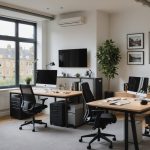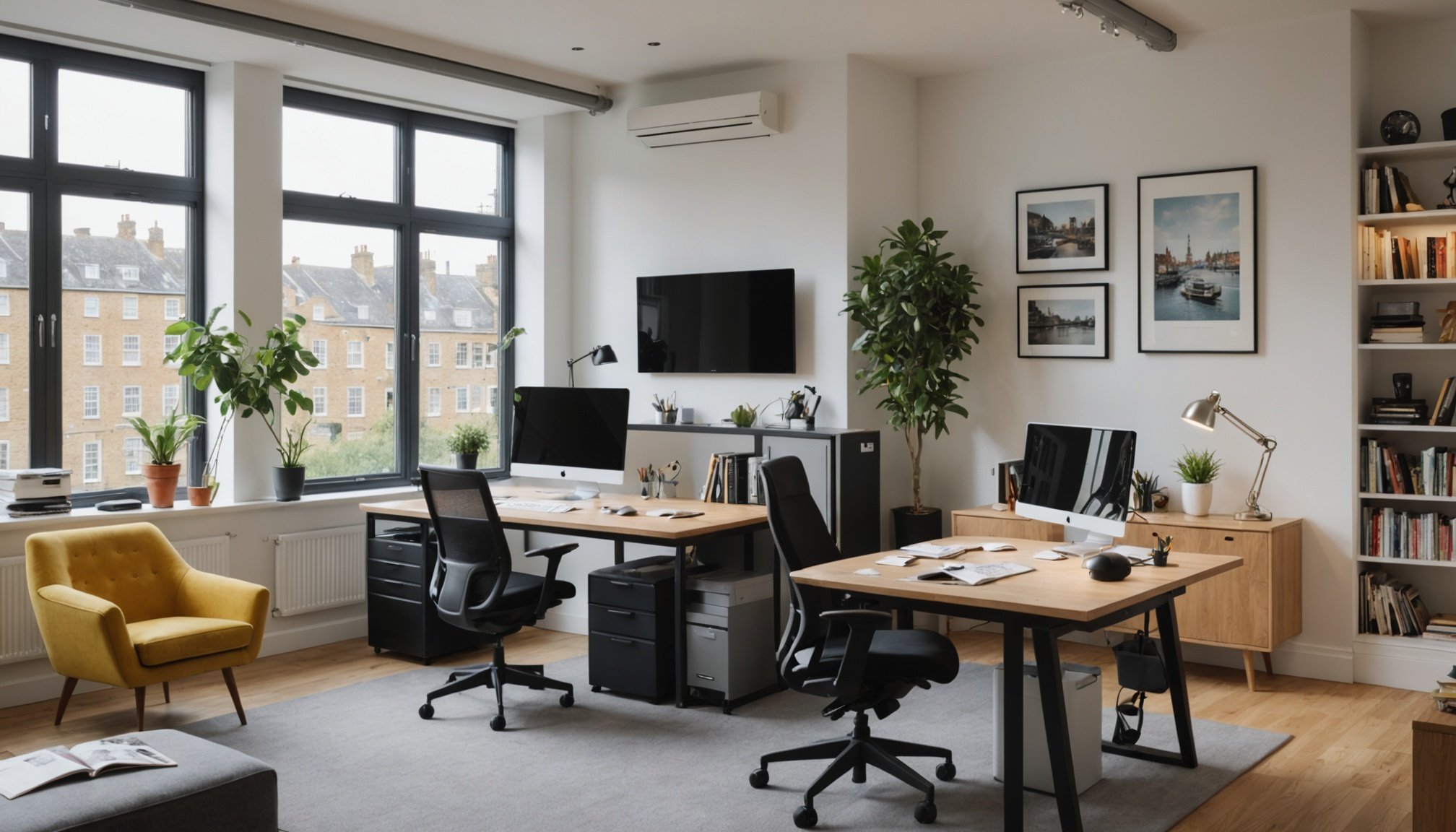Optimising Ergonomic Furniture for UK Home Offices
Creating a home workspace that promotes both productivity and health hinges on choosing the right ergonomic furniture. In the UK, where space can often be limited, selecting office chairs UK designed to provide ample support without overwhelming the room is vital. Ergonomic furniture such as adjustable office chairs UK and standing desks can significantly reduce strain from prolonged sitting or poor posture.
When considering workspace comfort, the height of your desk and chair plays a central role. Research indicates that your desk height should allow your forearms to rest parallel to the floor when typing, approximately at elbow height, while your chair height should ensure feet are flat on the ground or supported by a footrest. Adjustable standing desks offer the flexibility to alternate between sitting and standing, reducing fatigue and enhancing circulation during work hours.
Also to see : Unlock exclusive GBIS Leads to boost your installation business
For UK homes, space-saving solutions are essential. Compact office chairs UK with ergonomic support and foldable or height-adjustable standing desks can fit snugly into smaller rooms without compromising comfort. When selecting ergonomic furniture, it’s important to focus on the long-term benefits for posture and wellbeing, ensuring your workspace fosters efficiency while protecting against discomfort and injury.
Enhancing Workspace Lighting in British Homes
Lighting plays a crucial role in creating a productive and comfortable home office lighting UK setup. Maximizing natural light is one of the most effective ways to enhance mood and alertness throughout the workday. British homes, often challenged by limited sunlight due to weather or the orientation of rooms, benefit greatly from strategic lighting choices.
Also to see : Revamping uk home workspaces: the power of sustainable practices
In rooms with ample windows, positioning your desk near natural light sources helps reduce eye strain and increases overall focus. However, natural light alone may not suffice, especially in the shorter, darker days common in the UK. Here, combining desk lamps with carefully selected productivity lighting can make a significant difference. Task lighting should be adjustable and positioned to avoid glare on screens or papers, making small or cramped rooms feel brighter and more functional.
For windowless or north-facing UK rooms, which receive little to no direct sunlight, layering ambient and task lighting replicates the effects of natural light. Choosing lights with a cooler color temperature can help simulate daylight, boosting energy and mood. LED desk lamps with dimmable features provide flexibility to tailor brightness for different tasks, while ceiling fixtures with diffusers soften room lighting without harsh shadows. By thoughtfully integrating natural light and artificial sources, home office lighting in the UK can be transformed into an environment that supports productivity and well-being.
Efficient Layout Strategies for Limited Space
Designing a home office layout in a small space requires smart and practical planning, especially in the UK where flats and compact properties dominate. A key strategy is embracing a minimalist office approach, which focuses on essential furniture and clutter-free surroundings to maximize efficiency without sacrificing functionality.
Adapting multi-functional spaces for work is essential when room is limited. For instance, a dining table can double as a desk during working hours, or a nook under the stairs can transform into a compact workstation. These strategies allow you to integrate your work area seamlessly into everyday living spaces while keeping your home organized.
In many UK homes, real-world examples demonstrate creative use of space: vertical shelving reduces floor footprint, wall-mounted desks free up room, and fold-away furniture provides flexibility. The goal is clear—design a small space design UK that supports productivity by balancing comfort, accessibility, and style within tight quarters.
Noise Reduction Techniques for UK Home Workspaces
Creating a productive home office environment in the UK often means tackling noise from busy streets, nearby neighbors, or household activities. Effective home office noise reduction is essential to maintain focus and well-being when working remotely.
One of the most practical approaches involves soundproofing UK homes using accessible methods. For homeowners, adding acoustic panels to walls and ceilings can significantly reduce echo and block external noise. These panels absorb sound waves, creating a quieter workspace without major renovations. Renters can explore removable soundproofing options like door seals, draft stoppers, or thick curtains that limit noise intrusion efficiently.
Affordable noise-cancelling tools such as white noise machines or noise-cancelling headphones also complement soundproofing efforts. These solutions help mask disruptive sounds, improving concentration during calls or creative tasks.
By combining these techniques, UK remote workers can reduce distractions and foster a calm work environment, which is proven to enhance productivity and mental well-being. Sound control measures are not just about reducing noise; they actively support the quality of work and personal comfort throughout the day.
Integrating Technology for Seamless Workflows
Creating an efficient UK home office technology setup relies heavily on choosing the right wireless solutions and productivity tools that fit compact spaces. Essential hardware like high-speed routers ensure uninterrupted internet connectivity, a critical factor in maintaining workflow continuity. Investing in quality webcams enhances virtual communication, making meetings more effective and engaging.
Power management also plays a vital role. Utilizing smart power strips and surge protectors protects devices and allows convenient control over multiple gadgets, reducing clutter caused by tangled cables. For small UK rooms, clever storage solutions combined with disciplined cable management not only free up desk space but also reduce distractions, fostering a more focused work environment.
On the software front, productivity tools tailored to remote work are indispensable. Applications that streamline task management, collaboration, and scheduling can transform your daily routine, helping to meet deadlines effortlessly. Examples include cloud-based platforms that facilitate team communication and digital calendars that sync effortlessly across devices, keeping you organized regardless of location.
By integrating these technologies thoughtfully, your home office can become a hub of efficiency and comfort, tailored to the distinct demands of remote work in the UK.
Solutions for Common UK Home Workspace Challenges
Maximising productivity in diverse environments
Working from home in the UK often means facing unique challenges such as rental restrictions, limited space in older houses, and adapting to less conventional room layouts. Navigating these issues requires both creativity and understanding of UK-specific workspace issues.
When renting, tenants usually cannot make permanent alterations like drilling walls or repainting. To work around these rental restrictions, consider using removable hooks and adhesive strips designed for hanging lightweight shelves or organizing cables. These allow you to personalise your space without breaking tenancy agreements. Additionally, lightweight, freestanding furniture that can be easily moved or disassembled helps maintain flexibility without damage.
UK homes, especially older properties, often feature smaller or unusually shaped rooms. To maximise limited workspace, incorporate vertical storage solutions like tall shelving units or wall-mounted organizers. Using multi-functional furniture, such as desks with built-in storage drawers or fold-away desks, can help save precious square footage. Position your workspace near windows to enhance natural light, which improves focus and reduces eye strain.
Staying productive amid varying home environments is crucial. Establish clear routines, designate a specific workspace separate from leisure areas, and optimise ergonomics with adjustable chairs and proper screen height. Using noise-cancelling headphones or soft furnishings to dampen sound further improves concentration.
In summary, overcoming UK-specific workspace issues demands smart use of space and rental-compliant adjustments. These solutions empower you to create a comfortable, efficient home office regardless of structural limitations, keeping productivity high in a variety of home environments.







